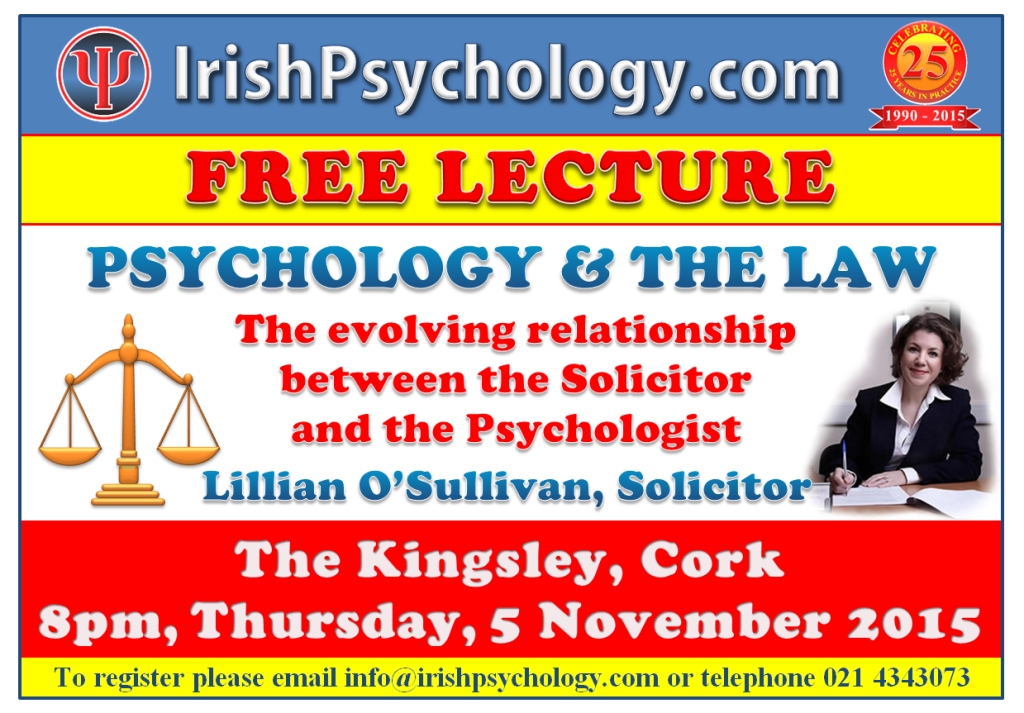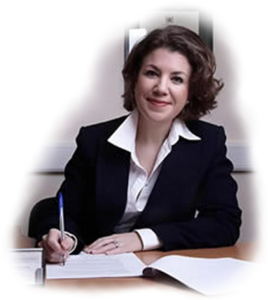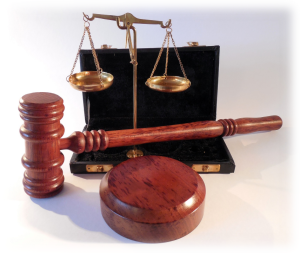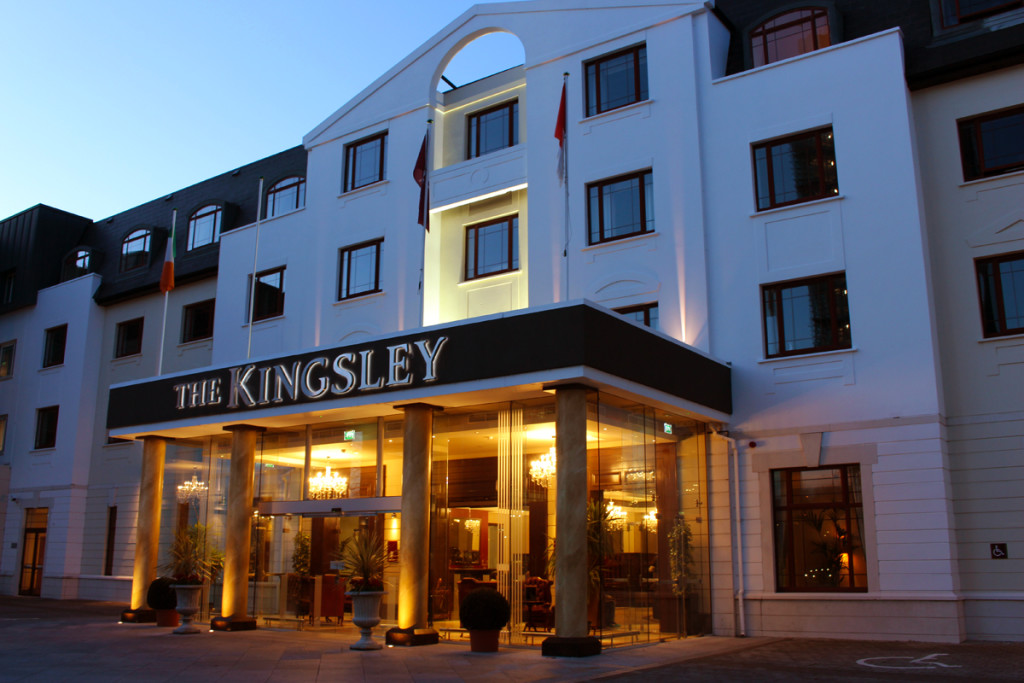Free Public Lecture at The Kingsley, Cork

 As part of our celebration of 25 years in practice, Dr. Gillian Moore-Groarke, Chartered Health Psychologist, cordially invites you to our free public lecture series. The attendance at our first two lectures “Mindfulness – Healing and Well-being” presented by Mr. Timothy Sweeney on 2 April 2015, and “A Post Trauma Observed” presented by Ms. Audrey O’Carroll on 3 September 2015, at The Kingsley, Cork, was overwhelming and we wish to thank everyone for their support.
As part of our celebration of 25 years in practice, Dr. Gillian Moore-Groarke, Chartered Health Psychologist, cordially invites you to our free public lecture series. The attendance at our first two lectures “Mindfulness – Healing and Well-being” presented by Mr. Timothy Sweeney on 2 April 2015, and “A Post Trauma Observed” presented by Ms. Audrey O’Carroll on 3 September 2015, at The Kingsley, Cork, was overwhelming and we wish to thank everyone for their support.
The final in our series of free lectures marking Dr. Gillian Moore-Groarke’s 25 years in practice will be given at The Deane Suite, The Kingsley, Cork, at 8pm on Thursday, 5th of November 2015. While the lecture is free, early booking is essential.
|
 Biography
Biography
Lillian O’Sullivan is a practising solicitor and the principal of Lillian O’Sullivan & Co., Solicitors based at 48 Maylor Street, Cork.
Lillian’s main practice areas include Family and Child Law and Employment Law in addition to providing full legal services in all areas of law.
Lillian completed her BCL (1998) and Masters Degree (LLM) (1999) at University College Cork. She has also completed Postgraduate Diplomas in International Arbitration (2002), Arbitration (2003) and Employment Law (2007) at University College Dublin.
Lillian O’Sullivan practised for a number of years with leading Irish law firm Arthur Cox in Dublin, gaining extensive experience in all areas of commercial law and litigation. After completing a Fellowship with the Permanent Court of Arbitration in The Hague, Holland in 2004, Lillian returned to Cork to develop a more general legal practice.
 Lillian has a keen interest in Alternative Dispute Resolution and has trained extensively in this area. She is a trained Arbitrator, Mediator and Collaborative Law Practitioner. She is committed to ensuring that her clients are fully aware of all methods available for the resolution of their disputes and she is fully qualified to advise and represent her clients in resolving disputes in the way which best suits their needs.
Lillian has a keen interest in Alternative Dispute Resolution and has trained extensively in this area. She is a trained Arbitrator, Mediator and Collaborative Law Practitioner. She is committed to ensuring that her clients are fully aware of all methods available for the resolution of their disputes and she is fully qualified to advise and represent her clients in resolving disputes in the way which best suits their needs.
Lillian has been a contributor to the Law Society of Ireland’s professional practice courses in Family Law, Employment Law and Commercial Law. She has lectured in Employment Law and Alternative Dispute Resolution on the MBA Course in UCC and has lectured at the Cork Law School and Griffith College Cork.
Lillian is a member of the Association of Collaborative Practitioners, an association established to promote and provide training to lawyers and other professionals in Collaborative Practice in Family Law. Lillian is a member of the International Academy of Collaborative Professionals (IACP) and the Resolve Collaborative Practice Group in Cork. Lillian is also a member of the Chartered Institute of Arbitrators Irish Branch and the Mediators Institute of Ireland.
All are welcome.
To register please email info@irishpsychology.com or telephone (021) 4343073.
Enter your details to make a reservation(s) for our Free Lecture titled "The evolving relationship between the Solicitor and the Psychologist" presented by Ms. Lillian O’Sullivan, Solicitor, at the Kingsley, Cork, at 8 pm on Thursday, 5 November 2015. Comments or questions are welcome.
The evolving role of the Psychologist in Irish Law
 In a system that is presented every day with complex and challenging issues relating to human behaviour, expert psychological input can serve to be invaluable in Irish law. However, the Irish court system, particularly in regards to family law, has been deemed as inadequate and insensitive to the promotion of justice, and to the psychological and emotional needs of vulnerable groups, such as children. In this vein, the role of the psychologist in Irish law, the shortcomings of the Irish court system, and the potential for change through the lens of psychological theory and input will be examined.
In a system that is presented every day with complex and challenging issues relating to human behaviour, expert psychological input can serve to be invaluable in Irish law. However, the Irish court system, particularly in regards to family law, has been deemed as inadequate and insensitive to the promotion of justice, and to the psychological and emotional needs of vulnerable groups, such as children. In this vein, the role of the psychologist in Irish law, the shortcomings of the Irish court system, and the potential for change through the lens of psychological theory and input will be examined.
Although law and psychology are perceived as two separate disciplines, in reality they both share several commonalities, as both fields make assumptions about what causes people to act in certain ways. However, while the role of law is to regulate human behaviour, the function of psychology is to understand it. As you can imagine, there are numerous situations where both must work in tandem, as the regulation of human behaviour and assessing outcomes for legal cases often involves being confronted with emotive and sensitive issues that require an in-depth understanding of psychological processes, and what may enhance or hinder human dignity. In cases that involve such complex issues, the input of experienced psychological expertise is invaluable.
Indeed, the role of the psychologist in Irish law is multifaceted, and is still evolving. For example, in civil cases, psychologists may be engaged as experts to assess emotional factors and psychological issues related to personal injury litigation, such as post-traumatic stress, depression, chronic pain or anxiety. Psychologists can also be involved in the assessment of psychological factors related to bullying or sexual harassment in the workplace, discrimination issues, and psychological disability. Psychologists may also be asked to evaluate the impact of victimization related to a criminal act, and provide counselling and psychotherapy to victims.
 In criminal cases, the experienced psychologist’s expertise is often invaluable to the court. Psychological evaluation of a defendant’s history and current mentality may aid in identifying psychological issues underlying criminal acts, and may inform treatment recommendations, which are often an important part of any plea agreements. For example, a juvenile delinquent from a low socio-economic background with a history of neglect may be required to attend counselling Additionally, psychologists provide counselling and psychotherapy for individuals accused of criminal acts, and for the victims of crimes, especially for those of a violent or sexual nature.
In criminal cases, the experienced psychologist’s expertise is often invaluable to the court. Psychological evaluation of a defendant’s history and current mentality may aid in identifying psychological issues underlying criminal acts, and may inform treatment recommendations, which are often an important part of any plea agreements. For example, a juvenile delinquent from a low socio-economic background with a history of neglect may be required to attend counselling Additionally, psychologists provide counselling and psychotherapy for individuals accused of criminal acts, and for the victims of crimes, especially for those of a violent or sexual nature.
Psychological consultation in family law is particularly complex, as outcomes that are in the best interest of the child are the psychologist’s ethical priority. Psychologists are often requested to provide custody or visitation evaluations to determine what arrangement is best for the child. Psychologists also provide family counselling, parenting skills training, therapeutic supervised visitation, anger management, divorce adjustment counselling, and parental communication skills training.
However, Irish law in practice does not always serve to promote and maintain human dignity. Little improvement has been made to Irish court law since the 1996 report of the Law Reform Commission, which stated that the Irish family law system was in “crisis”, and many have argued in recent years for an urgent change in the Irish family court system.
Indeed, Roisín O’Shea (2014) indicated in her extensive empirical review on Irish family court, that outcomes for children, separated fathers and foreign nationals leave much to be desired. O’Shea also concluded from interviews with Judges who hear family law cases, that the majority indicated an intense dislike for the emotional context of family law, and stated that they found disputes over arrangements for children difficult and sometimes distasteful. O’Shea’s findings indicate a worrying ignorance of the emotional and psychological dynamics of relationship breakdown, and an absence of judicial training.
Indeed, the Judge in family law cases generally acts as the sole arbiter. Research in social psychology also indicates that subjective mental processes have a significant impact on our decision making, especially when such processes aren’t brought to our awareness. Because of these mental short-cuts we use in everyday life, we exhibit a tendency to pay increased attention to information which is in line with our own values and beliefs. ( Judges are thus charged with carrying out resolution processes in a fair, impartial and efficient manner). (Naughton et al 2015)
Further, the issue of over-subjectivity in court becomes more salient when we look at Irish court outcomes. Indeed, research indicates that Irish family court Judges display a commitment to the traditional family unit (Naughton et al., 2015).
 These issues raise many questions regarding the future role of the psychologist in Irish family law, from one where the role, although multi-faceted, is regarded as peripheral, to one, which will underpin the framework from which Judges and other court staff will inform their outlook and decisions. Indeed, training and insights into emotional and psychological processes such as attachment and trauma should be prerequisites for any professional dealing with sensitive and life-altering issues regarding children. Although psychologists aren’t exempt themselves from allowing subjective processes and prejudices to influence their decisions and behaviours, it is hoped that through training and bringing such processes to conscious awareness, Judges and other court staff will be encouraged to avoid faulty decision making that adversely impacts families and individuals in family court. In the promotion of justice, dignity and equality, both disciplines should strive to work in unison, as the absence of emotional and psychological knowledge in litigation is having stark consequences on those who are most vulnerable.
These issues raise many questions regarding the future role of the psychologist in Irish family law, from one where the role, although multi-faceted, is regarded as peripheral, to one, which will underpin the framework from which Judges and other court staff will inform their outlook and decisions. Indeed, training and insights into emotional and psychological processes such as attachment and trauma should be prerequisites for any professional dealing with sensitive and life-altering issues regarding children. Although psychologists aren’t exempt themselves from allowing subjective processes and prejudices to influence their decisions and behaviours, it is hoped that through training and bringing such processes to conscious awareness, Judges and other court staff will be encouraged to avoid faulty decision making that adversely impacts families and individuals in family court. In the promotion of justice, dignity and equality, both disciplines should strive to work in unison, as the absence of emotional and psychological knowledge in litigation is having stark consequences on those who are most vulnerable.
Authors

Dr. Gillian Moore-Groarke, Chartered Health Psychologist.
Ms. Amy-Rose Hayes, Psychology Graduate PSI.
IrishPsychology.com, 5A Harley Court, Wilton, Cork. Tel 021-4343073

The Kingsley, Cork

The Kingsley, Cork

